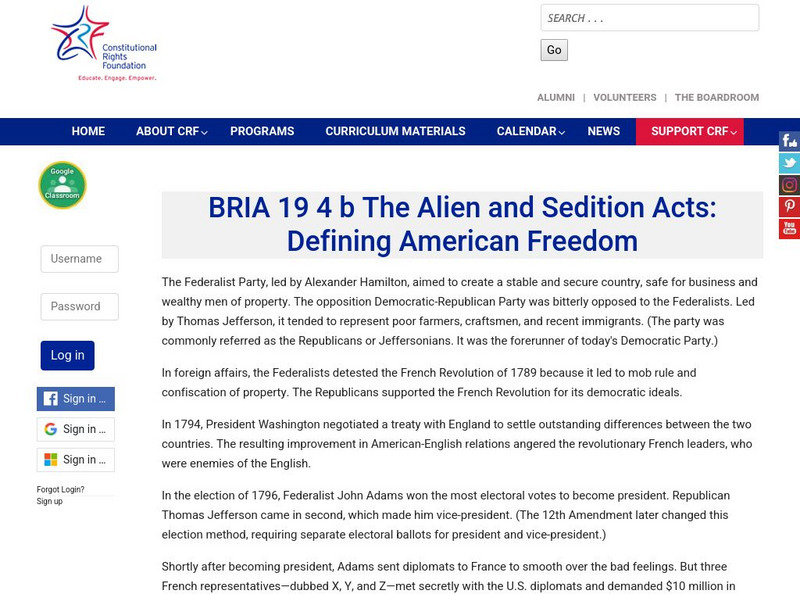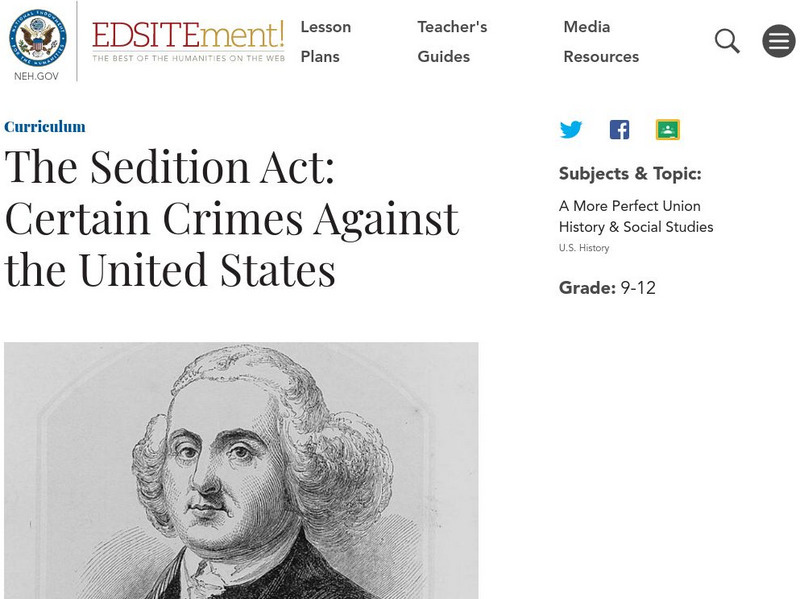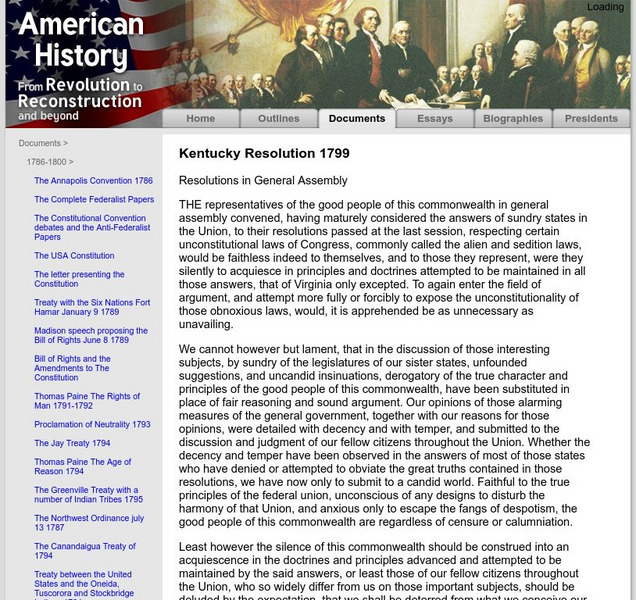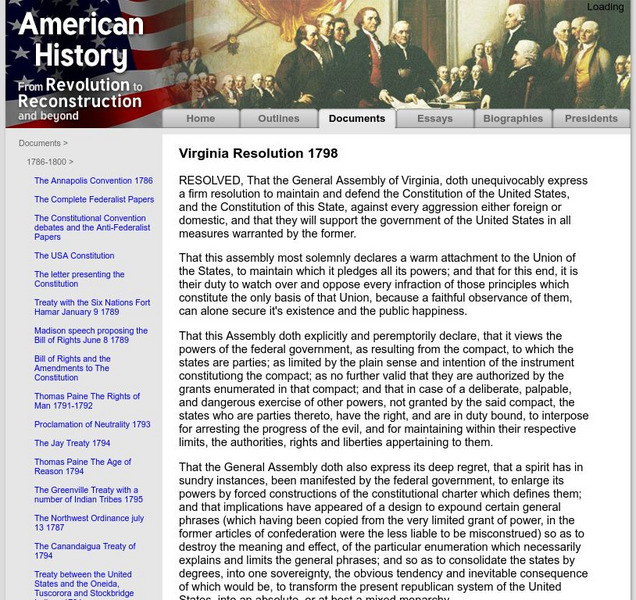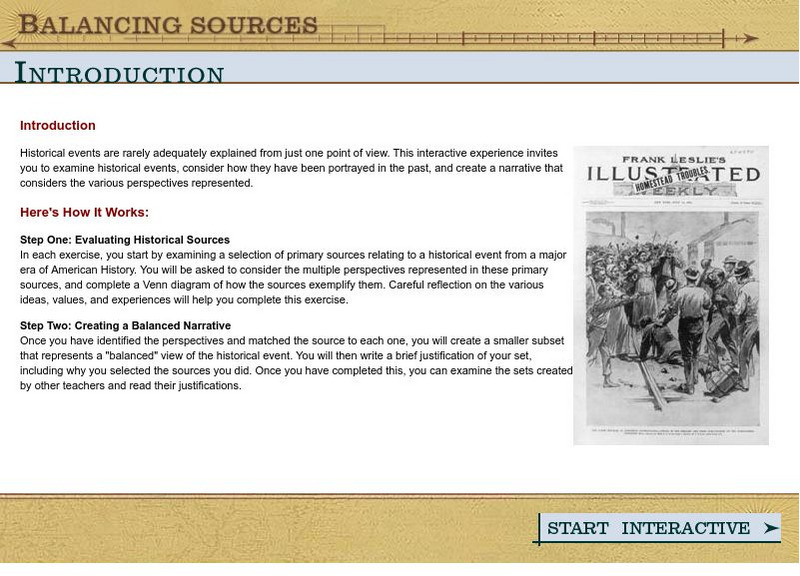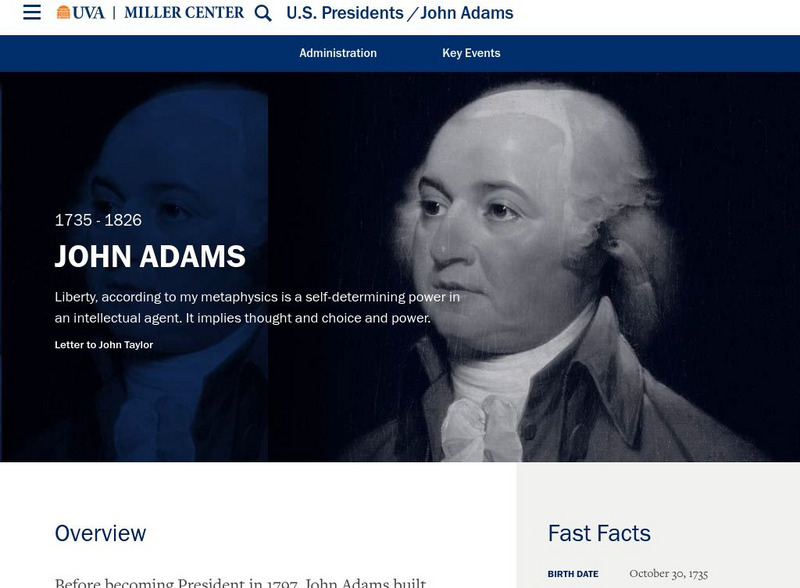US National Archives
Our Documents: The Alien and Sedition Acts (1798)
The Alien and Sedition Acts were passed by Congress in 1798 because of feared war with France. This engaging page gives you the opportunity to see a complete copy of the original document and also gives links to a typed transcript,...
Constitutional Rights Foundation
Constitutional Rights Foundation: The Alien and Sedition Acts: Defining American Freedom
Lesson with activity in which students study and analyze the challenges surrounding constitutional rights and national security by focussing on the Alien and Sedition Act, 1798 and definitions of American freedom. Links to primary...
University of Groningen
American History: Documents: The Sedition Act of 1798
Complete text of the Sedition Act of 1798 passed by the Federalists to strengthen national security.
National Endowment for the Humanities
Neh: Edsit Ement: The Sedition Act: Certain Crimes Against the United States
For this Curriculum Unit, students will consider "The Sedition Act: Certain Crimes Against the United States" in 5 Lessons. The unit also includes worksheets and other student materials that can be found under the resource tab.
Yale University
Avalon Project: Alien and Sedition Acts
This timeline provides links to the texts of the Alien and Sedition Acts, and the Kentucky and Virginia Resolutions that protested them.
Independence Hall Association
U.s. History: Alien and Sedition Acts
A great description of the Alien and Sedition Acts, passed by the Federalist Congress in 1798. See how the Federalists tried to hang on to power by restricting voting privileges and infringing on free speech and freedom of the press.
Varsity Tutors
Varsity Tutors: Archiving Early America: Alien and Sedition Acts
This article from Archiving Early America provides an explanation of the Naturalization, Alien, Alien Enemies and Sedition Acts, shows the original acts and provides transcribed texts of the Alien Enemies and the Sedition Acts.
Ohio State University
Osu History Teaching Institute: The Alien and Sedition Acts
Objective of this lesson is to understand the provisions of the Alien and Sedition Acts within their political and constitutional contexts.
Siteseen
Siteseen: American Historama: Alien and Sedition Acts of 1798
Provides a summary and interesting facts about the Alien and Sedition Acts that were laws relating to the rights of immigrants and free speech.
Digital History
Digital History: Sedition Act and the Virginia and Kentucky Resolutions [Pdf]
Read about the foreign policy problems the United States was having at the beginning of the Adams administration. See what led up the the passage of the Sedition Act and some ramifications of it, and the Kentucky and Virginia Resolutions...
University of Groningen
American History: Documents: The Kentucky Resolution of 1799
The full text of the Kentucky Resolution of 1799, in which the General Assembly of the Commonwealth of Kentucky declares its opposition to the Alien and Sedition Acts of 1798.
University of Groningen
American History: Documents: The Virginia Resolution of 1798
This resource presents the full text of the Virginia Resolution of 1798, in which the General Assembly of the State of Virginia protests the enactment of the Alien and Sedition Acts of 1798.
Digital History
Digital History: James Thomson Callender, Scandalmonger
James Thomson Callender was a little-known journalist whose writings made a big splash in the new American nation. Read about his attacks on political figures, and see what the Sedition Act had to do with his conviction of a crime.
Tom Richey
Tom richey.net: Adams Administration: Constitution in Crisis 1797 1801 [Ppt]
Presents key ideas for examining the issues faced by the Adams Administration including sectionalism, political partisanship, the Alien and Sedition Acts, and more.
Other
Behind the Scenes: The Mc Carran Internal Security Act
Read about the origins and impact of the McCarran Internal Security Act which President Harry Truman called "the greatest danger to freedom of speech, press and assembly, since the Alien and Sedition Laws of 1798." Find out how a fear of...
US National Archives
National Archives: How Have Americans Responded to Immigration?
How have Amercian's views on immigration changed over the course American history? What causes the shifts in acceptance? Students will view documents spanning the 19th and 20th century to answer those questions. They will examine...
Annenberg Foundation
Annenberg Classroom: Civil Liberties in Wartime
This website contains an interactive timeline about the history of civil liberties at wartime.
Annenberg Foundation
Annenberg Learner: Balancing Sources
This is from an American history course designed for teachers to enrich their knowledge and their teaching practice. This interactive is a set of nine exercises where teachers evaluate primary resources related to a specific event in...
US National Archives
Our Documents: Our Documents Welcome Page
Explore 100 selected milestone historical documents relating to American History. Click on the link to the list of links to documents. RI.11-12.8 seminal U.S. texts, W.11-12.9b US Doc Analysis.
University of Virginia
Miller Center at Uva: u.s. Presidents: John Adams
A great in-depth biography of John Adams. Topics include: his life before the presidency, campaigns and elections, domestic affairs, foreign affairs, and life after the presidency. Links to the first lady, his Cabinet members, and Staff...
OpenStax
Open Stax: Partisan Politics
By reading this section of a chapter on "The New Republic", students will be able to identify key examples of partisan wrangling between the Federalists and Democratic-Republicans, describe how foreign relations affected American...
University of Virginia
Miller Center at Uva: u.s. Presidents: John Adams: A Life in Brief
A good look at John Adams as president and the struggles he had both domestically and in foreign affairs. Read about how he kept America out of war and his political isolation because of his hard-held beliefs.
US Department of State
Office of the Historian: The United States and the Haitian Revolution
Study the roots of the Haitian Revolution and the American response. Our policy shifted many times from 1791 until we recognized Haiti's independence in 1862. Read the following synopsis to better understand our ambivalence.
Other
Presidents & the Constitution: War: Commander in Chief
The President of the United States has many powers. This site provides an extensive overview on the President's role as Commander in Chief and includes a video.

